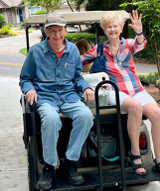A FRIENDLY GAME OF CATCH By Tom Golden
My son and I were playing a friendly game of catch. As I tossed him the ball, I noticed the mitt he was wearing. It had been my father’s baseball glove that he had used when I was in Little League. I remembered the many times my father had gone to Little League practice and coached or hit fly balls to us. Sports were not really his forte, but being part of my life was important to him. A scientist and researcher with NASA, he was a dedicated father who enjoyed spending time with his three children and involving himself with their individual interests.
My seven-year-old son, Luke, had chosen that particular glove as his own, perhaps because it was old and very flexible and perhaps due to it having belonged to his grandfather. That glove has given us many opportunities to talk about my father and his death. As we toss the ball back and forth, it is a link to my father and his history. Luke and I have had many of those conversations, usually quick and to the point. Luke might make a particularly good catch and then say it was the glove that helped him with such a spectacular play. I then might say, "Yeah, that’s a special glove. I sure do miss Granddaddy." Luke agrees and points out that he misses his sense of humor, and the game goes on. Those short interludes serve us both as a way to remember and honor our pain at the loss of my father and his grandfather. Healing grief is a matter of chipping away at the potent feelings over and over again. Taking small chunks during an activity such as playing catch is certainly a valid form of healing.
My daughter, Julia, who is thirteen years old, has a very different way to approach her pain. Julia will approach me and request "special time," meaning we are to sit and talk about something. She says, "I miss Granddaddy," and proceeds to talk about her feelings of loss. She already has the agenda and will happily orchestrate the conversation. This, too, is a valid form of healing.
Part of the reason for the difference between Julia and Luke is their ages. Julia is more developed both physically and psychologically and has a more sophisticated understanding of her emotions. But there is also a difference that has to do with gender. Luke loves to do things and maybe talk some while we are actively participating together. I learn more about Luke and his life while we are wrestling than at any other time. We will be grunting and groaning as we push at each other’s bodies, and all of a sudden he will stop and say something about his day. Just as quickly we are back at it again. This pattern continues, with brief flashes of self-disclosure during activities.
Julia, however, doesn’t seem to need the activity. She needs the emotional contact and attention. Both ways are healing; both need to be honored. Although I believe this is a gender difference, it could easily go the other way, with my daughter preferring activity and my son more inclined to talk. It is not that boys do it one way and girls another. It is that, as parents, we are responsible for finding our children’s individual gifts in healing themselves and then helping them use them. Grief is a potent force, and we need to find ways to steward our children’s connection with feelings of loss and their healing.
Grief is no different than any other process that children learn. As parents we steward our children’s anger, homework, sexuality, social skills, bathroom behavior and a long list of many others. We tend to be more active in our assistance with the younger ones and expect more from them as they grow and mature. We make decisions about what each child needs to know at any given time and find ways to teach the next level when they are ready. Homework might be a good example. Think of a very young child and how you help them with their studies. Usually we tend to be more active in finding an appropriate place for them to work and are also active in our help with their learning. As they grow older, we expect and teach different things. We do less of the actual work and more teaching of skills in how to work. This is stewardship. We give to them what they need at any given time, based on our understanding of their individual qualities and their level of development.
Stewarding a child’s grief is the same. We adjust our approach to their pain based on their level of development and our assessment of their needs. But stewarding grief is a tough task for parents who are actively grieving themselves. It is often a time when our "parent" energy to teach, help and engage our kids is at an all time low. We, too, are in need of healing. However, the saving grace is that by stewarding our children’s grief, we help ourselves to heal. Each time I have a burst of a conversation with Luke about my father, or each time Julia asks me for "special time," I get in touch with my own grief and loss related to my father’s death. By stewarding, I am also healing.
Sometimes parents want to hide their feelings of grief and loss from their kids. Occasionally this can be appropriate, but usually if the parent holds back, it stops the healing for both parent and child. The kids sense that there is something not being said and will pick up that this "holding back" must be the adult way to do things. We need to be open with our kids about our grief in a way that helps them to see that we are grieving. When we allow our kids to see our grief, we give them the best teaching we could provide: a role model. This can be helpful to both parents and children.
Reprinted from Grief Digest, 2004.




